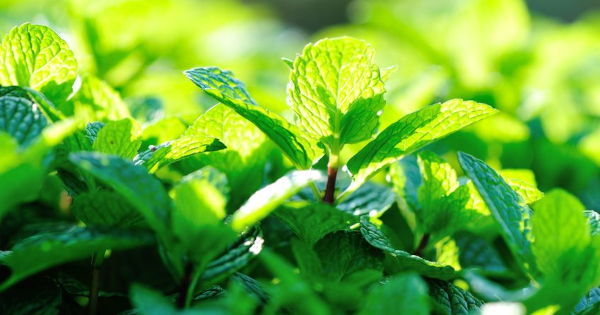Magical Mint: 20 Top Health Benefits
Visit our Re-post guidelines
Here are 20 health benefits you can expect from mint in its many different, wonderful forms, from peppermint to spearmint to wild mint
Mint is most popularly known for the cooling sensation it brings to the palate. But more than just being a flexible ingredient in herbal teas, sauces and dips, desserts and tasty beverages, it is also a rich source of health benefits.
Mint is the name representing a group of perennial herbs cultivated in various parts of the world, from the Mediterranean basin where it’s believed to have originated to Asia, the U.S., Morocco, Argentina and Europe.[i] Peppermint, spearmint and bergamot mint are just a few renowned species within the genus Mentha.
20 Mint Health Benefits
Let’s have a closer look at some of the refreshing science-based benefits of mint to human wellness.
- Alertness — In a study, smelling peppermint oil while driving led to greater alertness along with reduced levels of frustration, anxiety and fatigue.[ii]
- Allergic rhinitis — Peppermint may be clinically sound in alleviating the nasal symptoms of allergic rhinitis, including sneezing.[iii]
- Antifungal — In a study, many natural extracts demonstrated antifungal activity against Candida albicans, yet the strongest antifungal action was seen from peppermint, green tea, henna tree, rose geranium and Persian lime.[iv]
- Colic — A study concluded that peppermint is at least as effective as the drug simethicone in dealing with infantile colic, a distressing condition among infants for which there’s no proven standard treatment.[v]
- Colon cancer — Extracts from thyme, rosemary, sage, spearmint and peppermint can significantly inhibit the growth of colon cancer cells in humans, exhibiting combination effects on cancer growth.[vi]
- Constipation — Aromatherapy involving rosemary, lemon and peppermint can relieve constipation in elderly individuals, leading to a higher number of bowel movements, with effects lasting two weeks after treatment.[vii]
- Diabetes — Spearmint, or aqueous Mentha spicata extract, exhibited an interesting antidiabetic effect in animal models.[viii] Repeated oral administration lowered blood sugar in diabetic rats, comparable to drug (glibenclamide) treatment.
- Indigestion — A study showed that a combination of peppermint oil and caraway oil in capsule form provided effects similar to medications used against indigestion, helping address stomach pain and other digestive symptoms.[ix]
- Irritable bowel syndrome (IBS) –The menthol in peppermint oil is believed to help alleviate IBS symptoms, thanks to its relaxing effects on the muscles of the digestive tract.[x] A review also found that peppermint oil capsules improved symptoms notably better than placebo capsules.[xi]
- Liver damage — Spearmint compounds contain important antioxidant potential in protecting liver and erythrocytes against nicotine-induced oxidative damage.[xii]
- Memory and cognition — A study on 144 young adults revealed that smelling peppermint oil five minutes before an exam produced significant memory improvements.[xiii] Dracocephalum, a member of the mint family, was used by Iranian scientists in a series of placebo-controlled clinical trials on 42 people with early-onset to moderate Alzheimer’s, and was found to improve mental state, anxiety and irritability.[xiv]
- Mouth care — Essential oil mouthwash containing tea tree, peppermint and lemon may reduce bad breath and volatile sulphur compounds among intensive care patients.[xv]
- Nausea — Among surgical patients, aromatherapy with peppermint, ginger or a combination of both led to a statistically significant decrease in the need for antiemetics for treating postoperative nausea and vomiting.[xvi]
- Neck pain — Researchers found that an essential oil cream made from marjoram, black pepper, lavender and peppermint can be used to improve neck pain in patients.[xvii]
- Nipple pain — Peppermint water may alleviate nipple pain and damage associated with breastfeeding.[xviii]
- Osteoarthritis — Peppermint and rosemary essential oils may benefit osteoarthritis. A nanoemulsion containing the oils reduced related pain by increasing antioxidant capacity and improving the knee joints of animal subjects.[xix]
- Polycystic ovarian syndrome (PCOS) — Spearmint holds promise in treating PCOS by inhibiting testosterone and restoring follicular development in ovarian tissue.[xx]
- Respiratory health — Wild mint essential oil was found to prevent airway changes induced by histamine and ovalbumin in animal models, relaxing bronchial smooth muscles and suppressing immunological response.[xxi]
- Sleep — Aromatherapy, lavender and peppermint in a particular study, can help improve sleep quality in cancer patients, a group where this is a common issue.[xxii]
- Skin aging — Peppermint peel skin treatment may be an effective protocol in treating signs of skin aging, such as discoloration, wrinkles and skin inelasticity.[xxiii]
Discover much more about the wondrous benefits of mint on the GreenMedInfo.com database.
*WARNING: Always consult a medical herbalist or your health care practitioner when using both natural and pharmaceutical medicines for any diagnosed condition. This article is for informational purposes only and not intended to be used as medical advice.
References
[i] Salehi B et al “Plants of Genus Mentha: From Farm to Food Factory” Plants (Basel). 2018 Sep; 7(3): 70. Published Epub 2018 Sep 4.
[ii] Raudenbush B et al “Effects of Peppermint and Cinnamon Odor Administration on Simulated Driving Alertness, Mood and Workload” N Am J Psychol. 2009;11(2):245-256.
[iii] Inoue T et al “Effects of peppermint (Mentha piperita L.) extracts on experimental allergic rhinitis in rats” Biol Pharm Bull. 2001 Jan;24(1):92-5.
[iv] Hsu H et al “Herbal Extracts with Antifungal Activity Against Candida albicans: A Systematic Review” Mini Rev Med Chem. 2020 Jun 27. Epub 2020 Jun 27.
[v] Alves J et al “Effectiveness of Mentha piperita in the Treatment of Infantile Colic: A Crossover Study” Evid Based Complement Alternat Med. 2012 ;2012:981352. Epub 2012 Jul 12.
[vi] Yi W et al “Anti-tumorigenic activity of five culinary and medicinal herbs grown under greenhouse conditions and their combination effects” J Sci Food Agric. 2011 Aug 15 ;91(10):1849-54. Epub 2011 Mar 30.
[vii] Myung-Ae K et al “Effect of aromatherapy massage for the relief of constipation in the elderly” Taehan Kanho Hakhoe Chi. 2005 Feb;35(1):56-64.
[viii] Farid O et al “Antidiabetic effect of spearmint in streptozotocin-induced diabetic rats” Endocr Metab Immune Disord Drug Targets. 2018 May 16. Epub 2018 May 16.
[ix] Madisch A et al “Treatment of functional dyspepsia with a fixed peppermint oil and caraway oil combination preparation as compared to cisapride. A multicenter, reference-controlled double-blind equivalence study”Arzneimittelforschung. 1999 Nov;49(11):925-32.
[x] Hills J M et al “The mechanism of action of peppermint oil on gastrointestinal smooth muscle. An analysis using patch clamp electrophysiology and isolated tissue pharmacology in rabbit and guinea pig” Gastroenterology. 1991 Jul;101(1):55-65.
[xi] Khanna R et al “Peppermint oil for the treatment of irritable bowel syndrome: a systematic review and meta-analysis” J Clin Gastroenterol. 2014 Jul;48(6):505-12.
[xii] Saad A et al “Protective effects of Mentha spicata against nicotine-induced toxicity in liver and erythrocytes of Wistar rats” Appl Physiol Nutr Metab. 2018 Jan ;43(1):77-83. Epub 2017 Sep 11.
[xiii] Moss M et al “Modulation of cognitive performance and mood by aromas of peppermint and ylang-ylang” Int J Neurosci. 2008 Jan;118(1):59-77.
[xiv] Pravda.ru https://english.pravda.ru/science/136741-herbal_medicine_alzheimers/
[xv] Myung-Haeng H et al “Reduction of mouth malodour and volatile sulphur compounds in intensive care patients using an essential oil mouthwash” J Nutr. 2002 Apr;132(4):703-7.
[xvi] Fearrington M et al “Essential Oils to Reduce Postoperative Nausea and Vomiting” J Perianesth Nurs. 2019 May 27. Epub 2019 May 27.
[xvii] Ming-Chiu O et al “The effectiveness of essential oils for patients with neck pain: a randomized controlled study” J Altern Complement Med. 2014 Oct ;20(10):771-9. Epub 2014 Sep 5.
[xviii] Melli M et al “Effect of peppermint water on prevention of nipple cracks in lactating primiparous women: a randomized controlled trial” Int Breastfeed J. 2007;2:7. Epub 2007 Apr 19.
[xix] Mohammadifar M et al “Anti-osteoarthritis potential of peppermint and rosemary essential oils in a nanoemulsion form: behavioral, biochemical, and histopathological evidence” BMC Complement Med Ther. 2021 Feb 9 ;21(1):57. Epub 2021 Feb 9.
[xx] Ataabadi M et al “Role of Essential Oil of(Spearmint) in Addressing Reverse Hormonal and Folliculogenesis Disturbances in a Polycystic Ovarian Syndrome in a Rat Model” Adv Pharm Bull. 2017 Dec ;7(4):651-654. Epub 2017 Dec 31.
[xxi] Sharma S et al “Mentha arvensis essential oil suppressed airway changes induced by histamine and ovalbumin in experimental animals” Nat Prod Res. 2017 Apr 7:1-5. Epub 2017 Apr 7.
[xxii] Hamzeh S et al “Effects of Aromatherapy with Lavender and Peppermint Essential Oils on the Sleep Quality of Cancer Patients: A Randomized Controlled Trial” Evid Based Complement Alternat Med. 2020 ;2020:7480204. Epub 2020 Mar 25.
[xxiii] Scarano A et al “Evaluation of the effectiveness and safety of peppermint peel (PMP) soft peeling for skin ageing” J Biol Regul Homeost Agents. 2019 Nov-Dec;33(6 Suppl. 2):93-101.
The GMI Research Group (GMIRG) is dedicated to investigating the most important health and environmental issues of the day. Special emphasis will be placed on environmental health. Our focused and deep research will explore the many ways in which the present condition of the human body directly reflects the true state of the ambient environment.
– Come Like Us on Facebook – Check us out on Instagram – Sign Up for our Newsletter –
Subscribe to our New NOW Youtube Channel




 /www.greenmedinfo.com
/www.greenmedinfo.com








